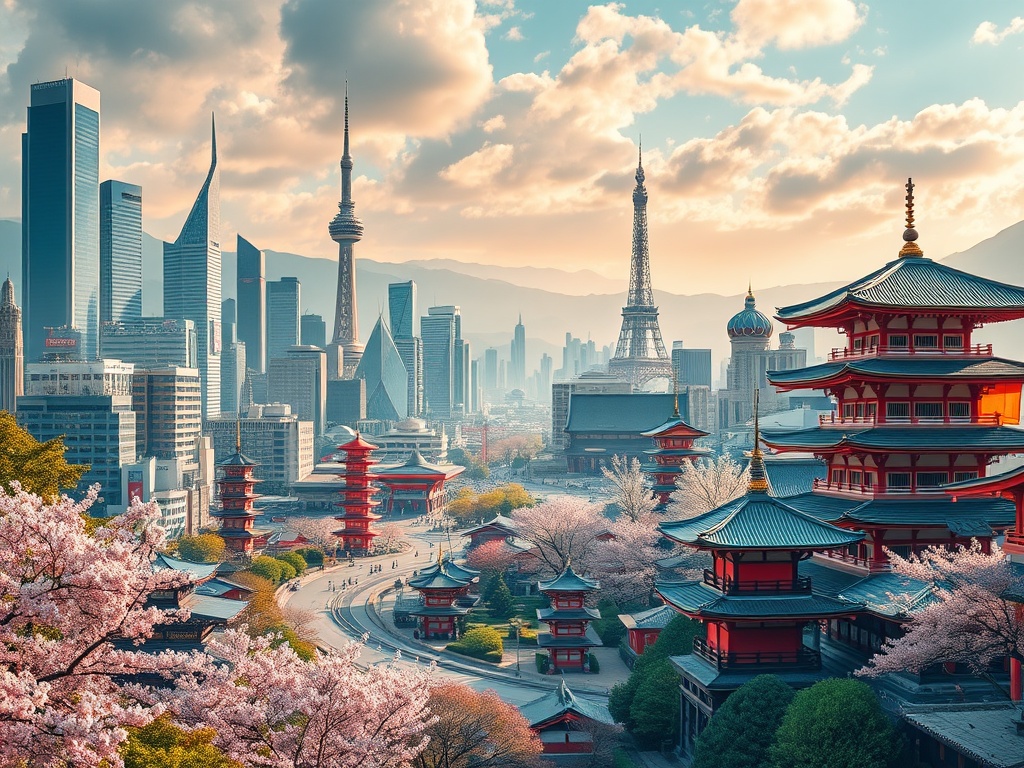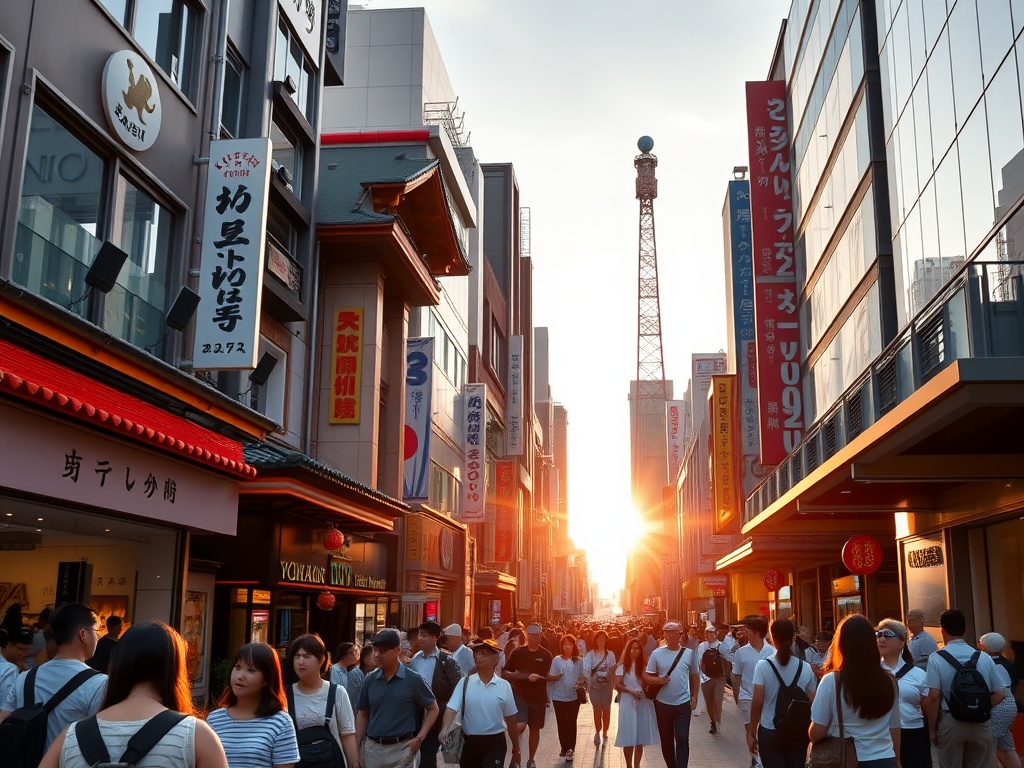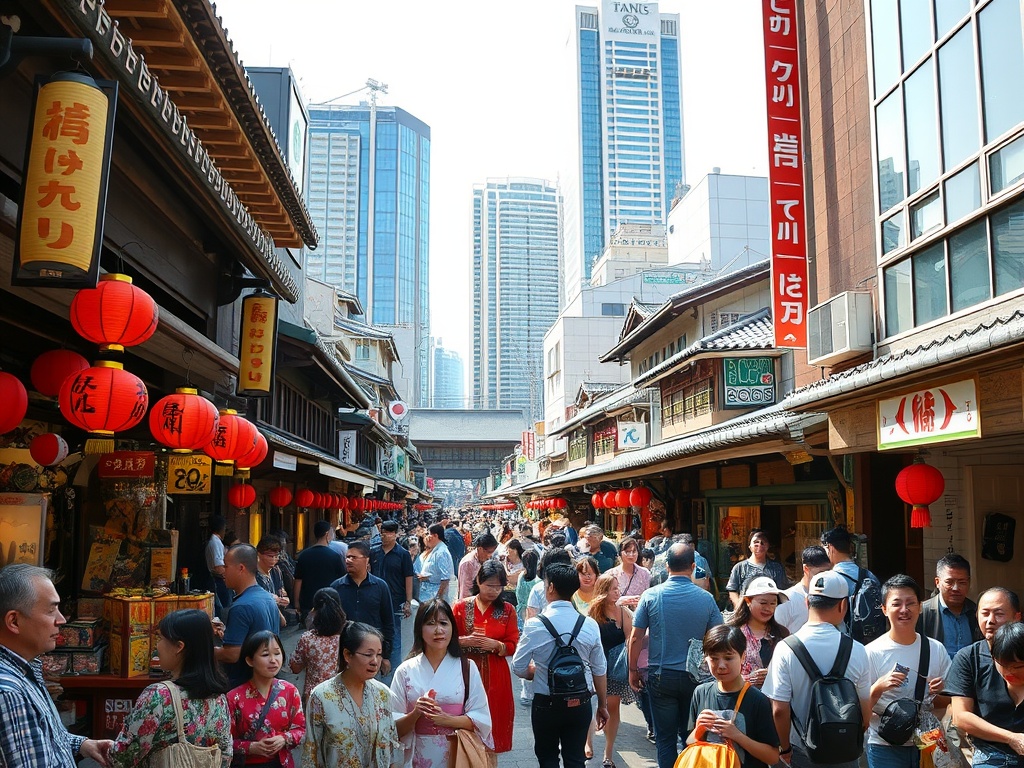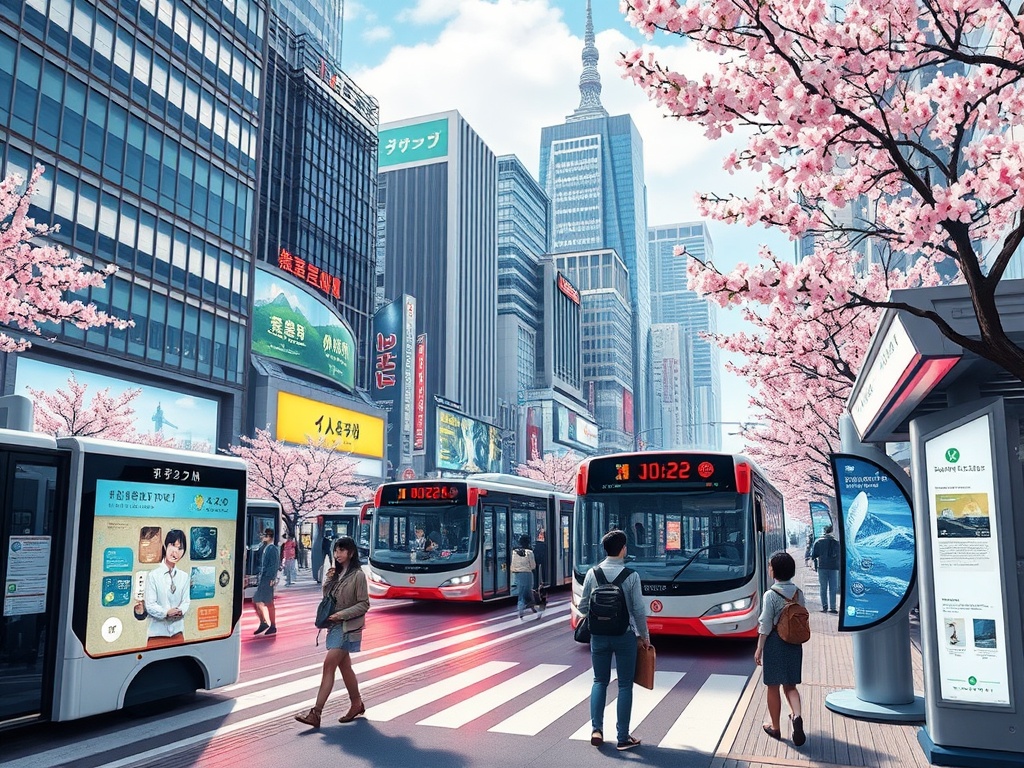The Rising Sun: How Japan’s Economic Growth Shapes Travel in 2024
Win a Free Trip to Japan!
Experience cherry blossoms and ancient temples
As Japan’s economy continues to blossom like its iconic cherry blossoms, it unveils a vibrant tapestry of growth that beckons travelers from every corner of the globe. In 2024, the fusion of economic dynamism and cultural heritage paints Japan as an irresistible travel destination. Dive into the story of how economic trends are transforming travel experiences in the Land of the Rising Sun.
Japan’s economy in 2024 is heavily buoyed by its prowess in technology. This technological advancement is not just limited to economic growth but also enhances the travel experience significantly. From cutting-edge AI-driven hospitality services to seamless public transportation systems, technology makes every traveler’s journey smoother and more engaging. Imagine having a personal tour guide powered by AI that crafts personalized itineraries or experiencing the efficiency of smart luggage systems at airports.
Among the tech innovations, here are some key highlights that travelers can look forward to:
- Smart Hotels: With automation and AI, hotels offer personalized experiences that anticipate guests’ needs.
- Advanced Transportation: High-speed trains and autonomous vehicles make exploring distant locales both quick and efficient.
- Virtual Tour Guides: Augmented reality (AR) applications provide immersive experiences at historical sites, offering deeper insights into Japan’s rich heritage.
Japan’s economic resurgence also revitalizes its cultural landscape, providing travelers with a richer tapestry of experiences. With increased investments in cultural preservation and entertainment, visitors can explore both traditional and contemporary facets of Japanese life. Festivals are grander, museums are more interactive, and local businesses offer unique products that reflect the nation’s economic vitality.
One area where economic growth is prominently visible is the culinary scene. Restaurants are experimenting with fusion cuisines, blending traditional Japanese flavors with international influences, offering food enthusiasts an exciting culinary journey.
The following table highlights some of the cultural hotspots that have thrived due to economic growth:
| Location | Experience |
|---|---|
| Kyoto | Traditional tea ceremonies with a modern twist |
| Tokyo | Interactive digital art exhibitions |
| Osaka | Gourmet street food markets |
Cultural Tourism: Embracing Japan’s Economic Evolution
In 2024, Japan’s economic vibrancy is mirrored in its cultural evolution, offering travelers an enriched tapestry of experiences that are deeply rooted in tradition yet dynamically modern. As the economy flourishes, so too does the landscape of cultural tourism, beckoning visitors with a promise of unique and unforgettable journeys into the heart of Japanese culture.
The resurgence of Japan’s economy has breathed new life into its traditional arts and practices. Travelers can immerse themselves in revitalized cultural experiences that are both authentic and innovative. In Kyoto, for example, ancient tea ceremonies are infused with modern elements, creating a harmonious blend that respects tradition while embracing change. These events not only preserve cultural heritage but also provide a fresh perspective for the curious traveler.
Moreover, the economic boom has enabled the restoration of historical landmarks and the enhancement of cultural institutions, making them more accessible and engaging. Museums across Japan now offer interactive exhibits that use cutting-edge technology to bring history to life, providing deeper insights into the nation’s rich past.
Japan’s economic expansion has also spurred a renaissance in contemporary art and cultural festivals. Cities like Tokyo and Osaka are now global hubs for avant-garde art, with interactive digital art exhibitions captivating audiences worldwide. These exhibitions challenge perceptions and invite visitors to engage with art in new and exciting ways.
Cultural festivals have become grander and more inclusive, welcoming international artists and performers to share their talents. The synergy between economic growth and cultural expression is palpable, as festivals now feature a broader array of events that highlight both local and global influences.
In sum, the intersection of economic growth and cultural tourism in Japan offers a plethora of opportunities for travelers to explore and appreciate the country’s dynamic evolution. From traditional ceremonies to contemporary art, every experience is enhanced by Japan’s unwavering commitment to cultural preservation and innovation.
Tech Wonders: Exploring Japan’s Economic Innovations for Travelers
As the beating heart of technological innovation, Japan in 2024 stands at the forefront of revolutionizing the travel experience. The nation’s relentless pursuit of excellence in technology has not only propelled economic growth but also transformed how travelers explore its islands. With an array of tech-driven marvels, Japan is a playground for those yearning to witness and experience the future, today.
Japan’s commitment to advancing smart travel solutions is evident in the seamless integration of technology into every facet of the journey. Upon arrival, travelers are greeted by airports equipped with smart luggage systems that ensure hassle-free handling and AI-driven kiosks that streamline the immigration process. These innovations are designed to minimize waiting times and enhance convenience, allowing visitors to focus on experiencing the wonders of Japan.
As you traverse through Japan’s cities, the country’s renowned transportation network exemplifies technological prowess. High-speed trains, a symbol of Japanese efficiency, now incorporate next-generation features that enhance comfort and connectivity. Autonomous vehicles, another marvel, are increasingly available in urban areas, providing tourists with a glimpse into the future of urban mobility.
For those eager to delve deeper into Japan’s rich cultural heritage, technology offers unprecedented opportunities for immersive experiences. Augmented reality (AR) applications transform visits to historical sites into interactive adventures, where the past is brought to life through vivid digital reconstructions. The blend of historical authenticity and modern technology provides travelers with a unique lens to explore Japan’s storied past.
Moreover, Japan’s commitment to innovation extends to its hospitality industry. Smart hotels, powered by AI, offer personalized experiences that cater to individual preferences, ensuring that each stay is as unique as the traveler. From automated room service to AI concierges, the hospitality sector is a testament to Japan’s dedication to enhancing guest experiences through technology.
In conclusion, Japan’s economic innovations in 2024 create a captivating landscape for travelers. By embracing the latest technological advancements, the country not only boosts its economy but also enriches the travel experience, making each journey a seamless blend of tradition and futuristic wonder.
Sustainable Tourism: Navigating Japan’s Economic Challenges
In 2024, Japan stands at a crossroads of economic prosperity and the pressing need for sustainable development, particularly in the realm of tourism. As travelers flock to the Land of the Rising Sun, attracted by its blend of tradition and cutting-edge innovation, the country grapples with the dual challenge of fostering economic growth while preserving its natural and cultural heritage. This balance is crucial not only for maintaining Japan’s allure as a travel destination but also for ensuring the long-term health of its tourism industry.
One of the primary hurdles facing Japan is the environmental impact of increased tourist activity. The surge in visitors places a strain on natural resources and local communities, necessitating solutions that promote eco-friendly travel practices. To address this, Japan is pioneering initiatives that emphasize conservation and responsible tourism. For instance, the government is investing in green infrastructure that supports sustainable travel, such as energy-efficient transportation systems and eco-conscious accommodations that minimize their carbon footprint.
Furthermore, the concept of community-based tourism is gaining traction as a means to decentralize tourism and alleviate the pressure on popular destinations. By encouraging travelers to explore lesser-known regions, Japan is not only distributing the economic benefits of tourism more evenly but also offering visitors a more authentic experience of the country’s rich cultural tapestry. This strategic approach helps preserve the integrity of heavily visited sites while injecting new life into rural economies.
Another significant aspect of sustainable tourism is the integration of technology to manage and enhance the travel experience. From AI-driven crowd management systems that prevent overcrowding at tourist hotspots to digital platforms that promote off-the-beaten-path attractions, technology plays a pivotal role in shaping a more sustainable tourism landscape. These innovations not only contribute to environmental conservation but also enrich the visitor experience by providing tailored recommendations and seamless travel solutions.
As Japan continues to navigate the complexities of economic growth and sustainability, its commitment to fostering a tourism model that respects both its people and the planet serves as a beacon for other nations. By championing sustainable practices, Japan is positioning itself as a leader in responsible tourism, inviting travelers to participate in a journey that celebrates not just the beauty of the country, but also its dedication to a sustainable future.
Gastronomic Journeys: The Economic Influence on Japan’s Culinary Scene
In 2024, Japan’s resilient economy has not only impacted its technological and cultural landscapes but has also significantly reshaped its culinary scene. As the nation thrives economically, its gastronomic offerings have evolved into a vibrant reflection of this prosperity, inviting travelers to embark on an unforgettable culinary odyssey. The fusion of economic vitality and culinary innovation makes Japan a must-visit destination for food lovers worldwide.
Japan’s economic boom has catalyzed a culinary renaissance, where tradition meets avant-garde creativity. Renowned for its meticulous attention to detail, the Japanese culinary world is now infused with a fresh wave of innovation. Chefs across the country are experimenting with bold flavors and techniques, influenced by international cuisines, yet deeply rooted in Japanese tradition. This evolution offers travelers a chance to savor dishes that are both familiar and novel, each telling a story of Japan’s dynamic economic landscape.
Moreover, the burgeoning economy has allowed for increased investment in the food industry, leading to the rise of high-end restaurants and vibrant food markets. These establishments not only highlight Japan’s rich culinary heritage but also showcase its commitment to sustainability and local sourcing. Travelers can indulge in farm-to-table experiences, where the freshness of ingredients is matched by the creativity of the culinary presentations.
As a nation at the forefront of technological advancements, Japan seamlessly integrates these innovations into its culinary sector. Smart kitchens and AI-enhanced dining experiences are becoming commonplace, providing travelers with a unique gastronomic journey. Picture dining in a restaurant where AI-driven recommendations guide you through a personalized tasting menu, or savoring a dish prepared with precision in a technologically advanced kitchen.
This blending of technology and cuisine not only enhances the dining experience but also underscores Japan’s commitment to pushing boundaries, offering visitors a taste of the future. The economic growth has spurred a cultural shift towards embracing these innovations, making each meal not just a feast for the palate but also a fascinating exploration of cutting-edge culinary science.
In essence, Japan’s culinary scene in 2024 is a testament to the nation’s economic vigor and cultural adaptability. As travelers embark on gastronomic journeys through the Land of the Rising Sun, they are met with a banquet of opportunities to explore and indulge, each bite a celebration of Japan’s economic and cultural evolution.
Heritage and Modernity: How Economic Changes Impact Japan’s Tourist Attractions
In 2024, Japan stands as a beacon of economic transformation, where the juxtaposition of heritage and modernity is more pronounced than ever. Travelers to this vibrant land are greeted with a unique blend of the ancient and the avant-garde, a testament to how economic growth has reshaped the country’s tourist landscape. This harmonious interplay invites visitors to explore Japan’s attractions through a fresh lens, where tradition and innovation coexist in a dynamic dance.
Japan’s economic resurgence has breathed new life into its historical sites, ensuring these cultural treasures are preserved and enhanced for future generations. With increased funding, many landmarks have undergone thoughtful restoration, blending state-of-the-art technology with traditional aesthetics. Visitors can now engage with history in unprecedented ways, as augmented reality guides offer immersive narratives, bringing the stories of ancient Japan to life. These technological enrichments allow travelers to experience the past while enjoying the comforts of modernity.
The economic boom has also inspired the creation of new attractions that reflect Japan’s contemporary identity. Urban centers like Tokyo and Osaka are now home to innovative architectural marvels and cutting-edge cultural venues. These spaces not only celebrate modern Japanese design but also serve as platforms for global cultural exchange. As travelers wander through these bustling cities, they encounter attractions that are the epitome of Japan’s economic vitality, offering a vibrant contrast to the serene beauty of its historical counterparts. Each visit is a discovery, a journey through time and technology, where the echoes of the past meet the innovations of the future.
Beyond the Yen: Currency Fluctuations and Travel Costs in Japan
The vibrant economic landscape of Japan in 2024 presents a fascinating backdrop for travelers venturing into this island nation. While technological innovations and cultural renaissance captivate the imagination, another crucial aspect shaping the travel experience is the dynamic nature of Japan’s currency—the Yen. Understanding the implications of currency fluctuations can help tourists better navigate travel costs, influencing everything from dining choices to experiential activities.
As Japan’s economy thrives, the Yen’s value is subject to a myriad of influences, including global market trends and domestic economic policies. For travelers, currency fluctuations can mean significant differences in the cost of travel essentials, such as accommodations, transportation, and dining. A stronger Yen might elevate expenses, prompting budget-conscious travelers to seek more affordable options or adjust their itineraries. Conversely, a depreciating Yen can make Japan a more attractive destination for international tourists, offering greater value for their currency. To make the most of their journey, travelers are encouraged to monitor exchange rates and consider pre-booking services that lock in favorable rates.
The influence of currency fluctuations extends beyond mere budgeting, impacting the overall travel experience in Japan. A higher travel cost due to Yen appreciation might encourage visitors to explore alternative accommodations, such as capsule hotels or traditional ryokans, which not only offer unique cultural insights but also present cost-effective lodging solutions. Additionally, tourists might opt for local eateries and street food markets, like those bustling through Osaka, where the experience is enriched by authenticity, despite the currency’s sway.
Moreover, savvy travelers can leverage currency dynamics to enhance their journey. During periods of a weaker Yen, visitors may find themselves indulging in luxury experiences such as high-end dining or exclusive cultural tours, which might otherwise be beyond their budget. This adaptability in travel planning underscores the importance of understanding economic trends and their tangible effects on travel costs.
| Currency Trend | Travel Impact | Suggested Adaptations |
|---|---|---|
| Strong Yen | Higher travel costs | Opt for budget accommodations and local dining |
| Weak Yen | Lower travel costs | Indulge in luxury experiences and exclusive tours |
Unveiling Opportunities: New Destinations in Japan’s Economic Landscape
Japan’s thriving economy in 2024 not only revitalizes its traditional attractions but also paves the way for new destinations that promise unique experiences for the discerning traveler. As economic prosperity spreads across the archipelago, lesser-known regions are emerging as compelling travel spots, offering fresh perspectives and untapped cultural riches. This exciting expansion invites explorers to delve deeper into Japan’s diverse landscapes, each echoing the vibrant pulse of economic growth.
As Japan’s economic influence permeates beyond urban centers, regions that were once off the beaten path are now gaining prominence. Areas like Tohoku and Kyushu are witnessing a renaissance, drawing visitors with their exquisite natural beauty, rich history, and burgeoning local industries. These regions are investing in sustainable tourism infrastructure, ensuring they maintain their allure while offering travelers an authentic taste of regional life.
In Tohoku, travelers can explore the serene landscapes and partake in traditional crafts revitalized by local artisans, buoyed by economic support. Meanwhile, Kyushu, with its volcanic hot springs and lush countryside, is becoming a wellness retreat, perfect for those seeking relaxation amid nature’s bounty.
The economic boom also opens avenues for ecotourism and adventure travel, catering to those with a penchant for the outdoors and sustainable exploration. Japan’s newfound focus on environmental conservation has given rise to eco-friendly destinations where nature lovers can immerse themselves in the country’s stunning biodiversity.
In Hokkaido, adventure enthusiasts can explore the untamed wilderness through eco-conscious trekking and wildlife tours, offering a profound connection with nature. Similarly, the Seto Inland Sea area beckons with its network of islands, ideal for cycling tours and cultural explorations that highlight the harmonious coexistence of nature and innovation.
Top Emerging Destinations in 2024:
- Tohoku: Discover ancient traditions and breathtaking landscapes.
- Kyushu: Experience wellness and rejuvenation in nature’s embrace.
- Hokkaido: Engage in eco-friendly outdoor adventures.
- Seto Inland Sea: Cycle through scenic islands and cultural gems.



